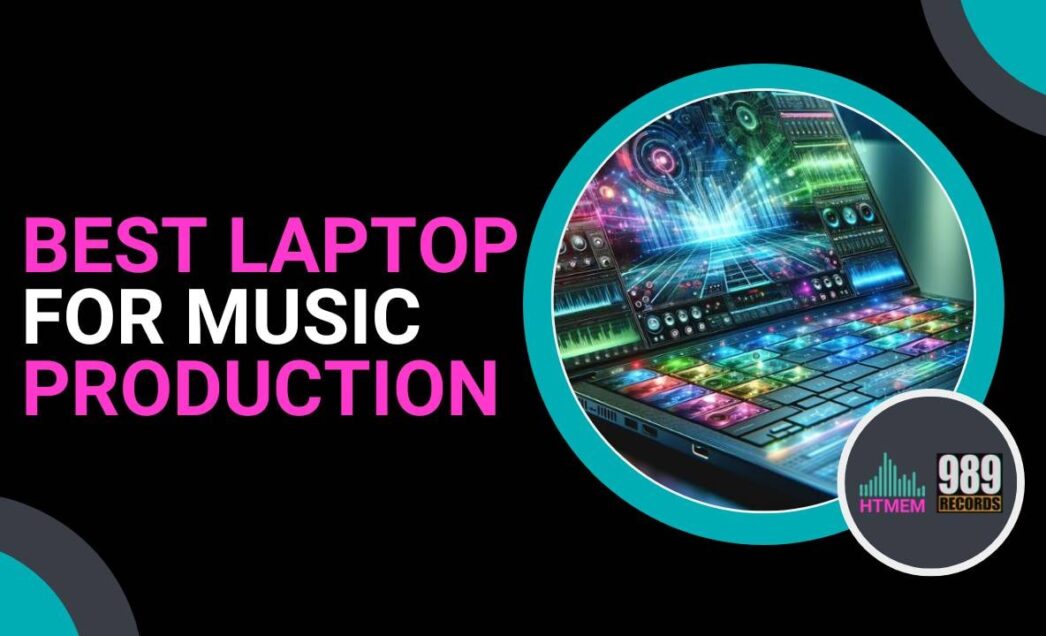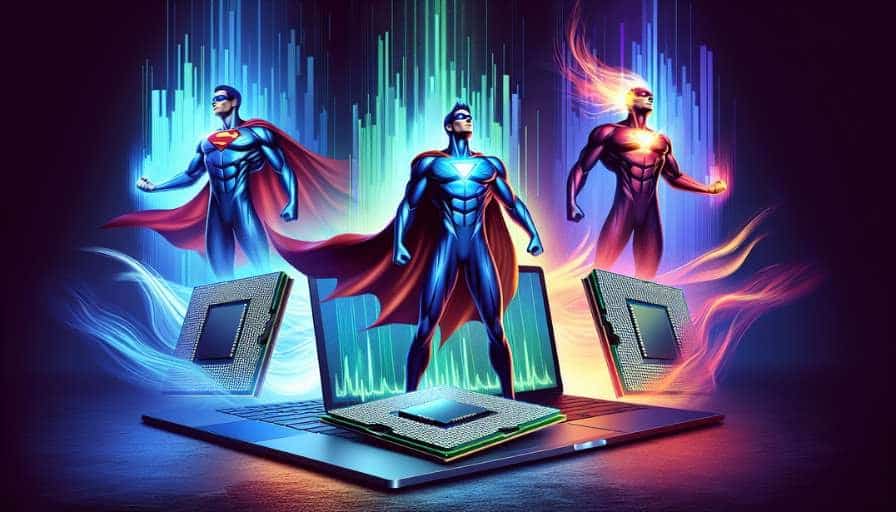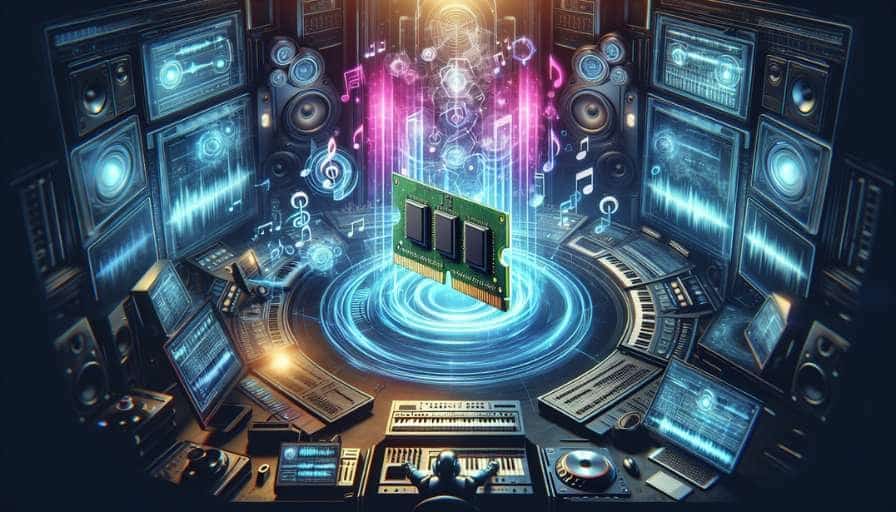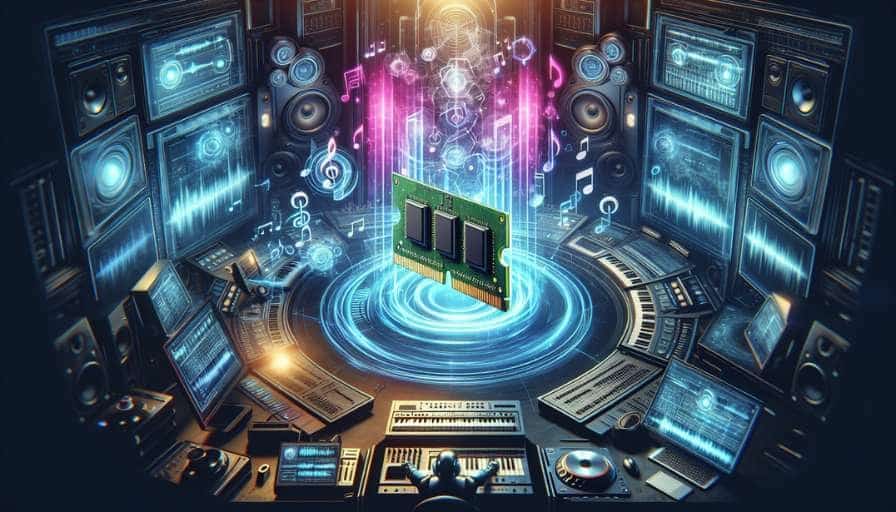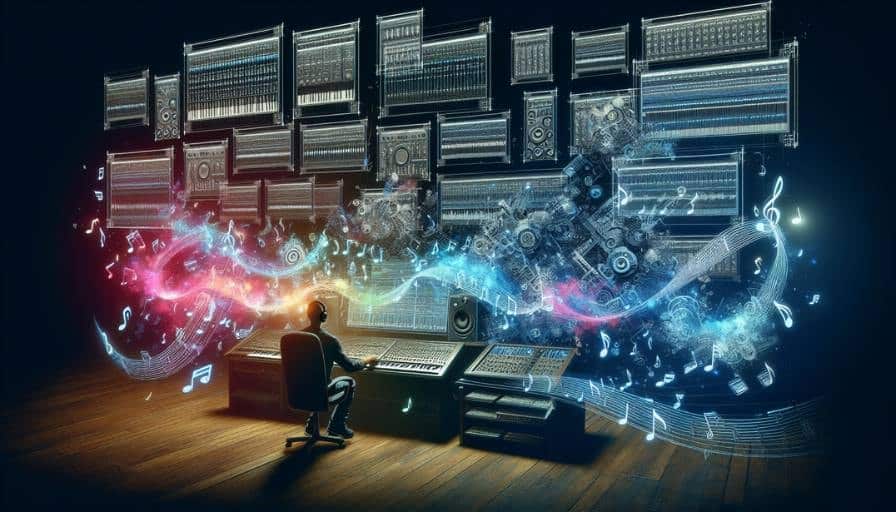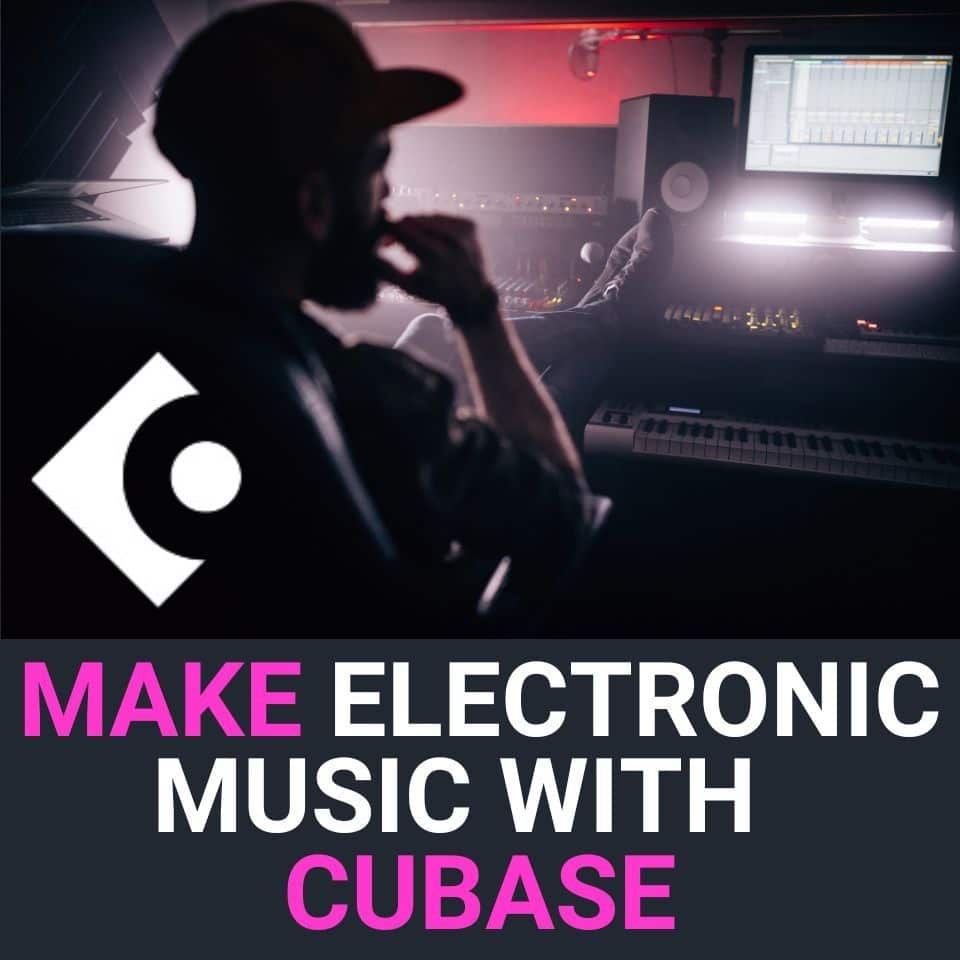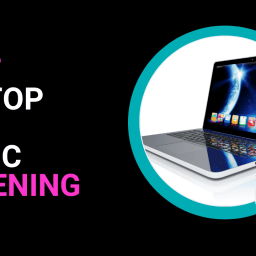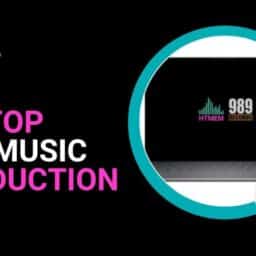Discovering the best laptops for music production involves balancing raw performance, dependable storage, smooth connectivity, and lasting portability. As a music producer, your laptop is more than just a tool; it’s your portable studio.
An audio interface is crucial in a music production laptop as it ensures high-quality sound input and output, which is essential for professional-grade music production.
This guide cuts through the noise to help you pinpoint the features that matter most—from powerhouse processors to multitasking RAM, all the way to the types of ports that keep your gear in sync. We’ll explore the landscapes of leading CPUs, minimum RAM requirements, SSD benefits, and more, laying out a roadmap for you to make an informed decision without getting weighed down by technical jargon.
Key Takeaways
- Musicians need laptops with powerful multicore processors like Intel Core i9, AMD Ryzen 9, or Apple’s M3 series and a minimum of 8GB RAM (preferably 16GB) for efficient music production, and the ability to expand memory is crucial for future-proofing.
- Solid State Drives (SSDs) are essential for fast storage with a minimum recommended capacity of 1TB, while external HDDs provide additional archival space for extensive audio libraries.
- Portability, long battery life, high-resolution displays, and an array of connectivity options including USB-C and Thunderbolt ports, are key features for music production laptops, with gaming laptops emerging as a powerful, though potentially more costly, alternative.
- Built-in MIDI controllers offer a more intuitive and hands-on music production experience.
Table of Contents
Powerhouse Processors for Music Production
Memory Matters: RAM Essentials
Storage Solutions for Audio Files
Display Dynamics: Screen Size and Quality
Port Profiles: Connectivity for Creatives
Sound Strategy: Audio Interfaces and Speakers
Battery Life and Portability
Operating Systems: Mac OS vs. Windows
Gaming Laptops: An Unexpected Choice?
Design Details: Form Factor and Build
Summary
FAQ
Choosing the Right Laptop for Music Production
What to Consider When Buying a Music Production Laptop
Selecting the right laptop for music production is akin to choosing the perfect instrument; it needs to meet your specific needs and enhance your creative process. Here are some key factors to consider:
- Processor: The heart of your laptop, a fast processor, is essential for running multiple tracks and plugins simultaneously. Opt for a current-generation Intel or AMD processor to ensure smooth performance.
- RAM: Think of RAM as your laptop’s short-term memory. Ample RAM, ideally 16GB or more, allows you to run multiple applications and plugins without a hitch, ensuring a seamless workflow.
- Storage: A large storage capacity is crucial for housing your music files, plugins, and software. An SSD (Solid State Drive) offers faster data access and reliability, making it the preferred choice for music producers.
- Operating System: Both Windows and macOS are suitable for music production. Choose the one you are most comfortable with, as both have their unique advantages and compatible software.
- Display: A high-resolution display is your visual workspace, allowing you to see your tracks and plugins clearly. Look for a laptop with a crisp, clear screen to make detailed adjustments easier.
- Portability: If you plan to take your music on the road, a lightweight and compact laptop is essential. Portability ensures you can produce music wherever inspiration strikes.
- Battery Life: Long battery life is a must for mobile music production. Aim for a laptop that offers at least eight hours of battery life to keep your creative sessions uninterrupted.
By considering these factors, you can find a laptop that not only meets your technical needs but also complements your creative workflow.
Powerhouse Processors for Music Production
Laptops for music production require powerful processors to handle the demands of digital instruments and audio plugins with precision. Brands like Intel with their Core i9, Intel Core i7, AMD’s Ryzen 9, and Apple’s M3 series lead this symphonic charge, offering the processing power needed to bring your music production to life.
These CPUs guarantee a seamless music-making process, whether you’re layering tracks in Ableton, sculpting sounds in Serum, or arranging scores in Sibelius, all with the help of music production software.
CPU Specifications for Music Creation
Music producers aim to balance single-threaded performance and multicore power when looking at music production specifications cpu. A processor like the Intel i5 12500, with its symphony of cores and heightened clock speed, provides the tempo needed for managing multitudes of tracks and plugins.
The blend of speed and multitasking muscle, found in processors from Apple’s M1 Pro to the Intel Core i7 variants, enables music creators to compose without compromise.
Multicore Processing Power
Multicore CPUs are the heroes of music production, working behind the scenes to ensure that your sonic landscape is rich and free of glitches. These marvels of technology allow producers to layer tracks and virtual instruments, creating complex arrangements that once would have brought lesser machines to their knees.
Memory Matters: RAM Essentials
RAM, similar to an experienced composer’s vast memory, keeps all elements of a production-ready for instant recall. With a minimum of 8GB recommended and 16GB DDR4 offering the sweet spot for efficiency, RAM is the silent partner in your production, keeping the workflow smooth and responsive as you switch between sounds and samples.
How Much RAM Is Enough?
Getting the RAM capacity right is vital. Start with 8GB if your compositions are more intimate, but for orchestrating larger arrangements with aplomb, 16GB is the ensemble you need. This ensures that your digital audio workstation (DAW) and all your plugins perform harmoniously, free from the dreaded stutter or lag that can disrupt your creative flow.
Expandability Options
As your music evolves, your laptop should keep pace. Expandability is the bridge to future-proofing your technology, ensuring that as your production needs grow, your laptop can rise to the occasion. Adding more RAM can extend the life of your system, giving you the freedom to push the boundaries of your musical expression.
Storage Solutions for Audio Files
Within the digital realm of music production, storage serves as the performance stage for your audio files. SSDs, with their brisk pace and steadfast reliability, are the virtuosos of storage, ensuring that your samples and tracks are always ready for their cue 🔥
With a minimum of 1TB recommended, these drives are the silent workhorses that keep the show running without a hitch. For those with extensive audio libraries, external HDDs provide an excellent solution for additional storage, offering ample space to keep your files organized and accessible.
Solid State Drive Advantages
The advantages of solid-state drives in music production are as clear as the sound of a bell. With their rapid read and write speeds, SSDs are like having a skilled assistant for a concert pianist, always ready with the next score, smoothing the transitions between heavy file loads and complex projects.
External Storage Alternatives
But what of the archives, the vaults of past performances and projects? Here, external HDDs play their part, offering a flexible solution for the vast libraries of audio files that a music producer accumulates over time. BTW, this is one of my go-to choice.
Display Dynamics: Screen Size and Quality
Despite often being overlooked, the visual component of music production, including a larger screen size and high-resolution display, can have a significant impact. They provide the canvas on which complex arrangements are painted, allowing producers to multitask with ease and precision.
Bigger Screen, Better Workflow
Just as a grand piano provides richer sound than its upright counterpart, a bigger screen enhances workflow. The expansive visual workspace allows you to keep an eye on each element of your mix, ensuring that no detail is missed.
High-Resolution Displays
High-resolution displays are the maestros of pixel precision, essential for tasks that extend beyond audio, such as video editing or designing album artwork. With colors as vivid as the soundscapes you create, these displays bring a new dimension to your production, making every detail as clear as a high note in a soprano’s range.
🔥 Do not overlook this detail; your eyes are as important as your ears.
Port Profiles: Connectivity for Creatives
A laptop decked with USB-C, Thunderbolt, and traditional USB ports is like a studio with every cable and connector at the ready, ensuring that your instruments and peripherals harmonize without a hitch.
USB-C and Thunderbolt Ports
USB-C and Thunderbolt ports are high-speed conductors for data transfer, enabling swift passage of large audio files and seamless connection with modern audio interfaces. These ports are the lifelines for creatives, ensuring that your production setup is as current as the latest hit tracks.
Additional Port Requirements
However, a nod to the classics is important too. At least one USB Type-A port ensures backward compatibility, offering a hand to older peripherals that still play a vital role in many a producer’s repertoire.
Sound Strategy: Audio Interfaces and Speakers
While you infuse life into your tracks, bear in mind that built-in laptop speakers only provide a faint echo within the cathedral of sound. To truly hear the depths and heights of your mix, high-quality audio interfaces, and powered monitor speakers are the choirs that bring forth the full range of sonic splendor.
Importance of a Good Audio Interface
A good audio interface with a proper bit-depth is the high-fidelity translator between your musical ideas and the digital domain, capturing the nuances of every note with clarity and precision. It is the cornerstone of a professional music production setup, providing the connectivity and quality needed to elevate your sound.
Evaluating Laptop Speakers
Assessing laptop speakers for their fidelity can be likened to judging a violin based on its case. For the truest auditory experience, professional headphones or studio monitors connected to an audio interface via a headphone jack are the instruments of choice, ensuring that what you hear is as authentic as the music you envision. By the way, soundproofing your studio is another effective method to ensure that you can trust what you’re hearing.
BOTTONE:
Battery Life and Portability
Modern music production’s nomadic nature calls for laptops that combine battery life and portability, enabling you to seize inspiration anywhere it strikes – be it the tranquility of a lakeside retreat or the buzz of a bustling cafe. The Samsung Galaxy Book4 Pro is an excellent example of a laptop that offers long battery life for mobile music production. To ensure the best experience, it’s essential to consider the music production specifications of your device, as well as the various music production tasks you’ll be performing.
Longevity on the Go
Around eight hours of battery life is the sweet spot for producers on the move, providing the endurance to craft and tweak productions without the tether of a power cord. Laptops like the Samsung Galaxy Book4 Pro deliver this with ease, promising a full day’s worth of creativity on a single charge.
Compact Laptop Choices
And for those who live life on the stage and in the studio, the best laptop options such as compact laptops like Apple’s MacBook Air offer the freedom to roam without burden, ensuring that your setup is as mobile as your lifestyle.
Operating Systems: Mac OS vs. Windows
Your music production laptop’s heartbeat is its operating system, which continues to fuel the age-old debate of Mac OS vs. Windows. Each system sings its own tune, with Mac OS striking a chord for those with an affinity for seamless integration and a less restrictive budget. Logic Pro harmonizes perfectly with Mac OS, offering a suite of tools for music production.
Apple’s Ecosystem Advantages
In the realm of Mac OS, Apple’s Logic Pro stands as a bastion of intuitive design, offering a suite of tools that harmonize perfectly with the operating system. The plug-and-play compatibility is a boon for producers, minimizing setup time and maximizing creativity.
Windows Flexibility and Variety
Conversely, a Windows laptop marches to the beat of flexibility and variety, offering a spectrum of options that cater to different levels of production needs and budgets. From customizable hardware to the freedom to upgrade components, Windows machines empower producers to tailor their systems to their unique sonic signature.
Gaming Laptops: An Unexpected Choice?
Although gaming laptops may appear to be unlikely candidates, they boast a range of features that align perfectly with music production demands. With their robust build and high-end specs, these machines are more than capable of running resource-intensive digital audio workstations and plugins, making them a suitable laptop for music production. Additionally, the Dell XPS 17 is a powerful yet non-portable device suitable for music production.
Gaming Laptop Features Beneficial to Music Production
The crossover appeal of gaming laptops lies in their advanced cooling systems, high-quality displays, and powerful processors, which can all serve a music producer’s needs. A PC laptop like the Dell XPS 17, known for its performance, design, and screen quality, is a powerful yet non-portable device suitable for music production, gaming, and work. These laptops are built to withstand the heat of gaming battles, much like they can endure the intensity of marathon mixing sessions.
💰 Price Comparison: Gaming vs. Music Production Laptops
However, the symphony of features in gaming laptops does come at a higher cost. But, when weighed against their prowess in music production, the investment is justified by the performance and versatility they offer.
Design Details: Form Factor and Build
The design of a music production laptop goes beyond mere aesthetics; it significantly influences the user experience, impacting both use ease and accessibility. From the sleek profile of the Surface Laptop 4 to the innovative Asus ROG Zephyrus G14, the form factor and build quality play a crescendo role in the life of a music producer. The Asus ZenBook Pro Duo, with its dual-screen setup, enhances control and efficiency in music production, making it an excellent example of how design can improve workflow.
Dual-Screen Laptops for Enhanced Control
Consider dual-screen laptops like the Asus ZenBook Pro Duo, presenting a wealth of laptop screen space that can be leveraged for improved control and efficiency. With such tools, music producers can deftly juggle multiple plugins and DAWs, keeping their creative process in perfect harmony.
Durability and Quality
The durability and build quality of a laptop are like the sturdy case of a precious instrument, protecting and preserving its ability to perform. MacBooks, especially the MacBook Pro, with their premium design and solid construction, have become a mainstay in the music production community, revered for their resilience in the face of the rigors of travel and frequent use.
Top Laptops for Music Production
Top Picks for Music Production Laptops
Choosing the best laptop for music production can be daunting, but here are some top picks that stand out for their performance and reliability:
- MacBook Pro 14 (M3, 2023): A favorite among music producers, the MacBook Pro 14 offers a powerful M3 processor, ample RAM, and a stunning high-resolution display. Its seamless integration with macOS and music production software like Logic Pro makes it a top choice.
- Asus Zenbook 14 OLED (UX3405): This laptop combines power and affordability, making it an excellent value for music producers. Its vibrant OLED display and robust performance ensure you can handle complex projects with ease.
- MacBook Air: For those seeking a more budget-friendly option, the MacBook Air delivers a fast processor and sufficient RAM in a sleek, portable package. It’s perfect for producers who need a reliable laptop without breaking the bank.
- Dell XPS 17: If you prefer a larger screen, the Dell XPS 17 is a top pick. Its expansive display, powerful processor, and ample RAM make it ideal for detailed music production tasks, providing a desktop-like experience in a portable form.
These laptops offer a range of features and price points, ensuring there’s an option for every music producer’s needs and budget.
Special Features for Music Production
Laptops with Special Features for Music Production
Some laptops come equipped with special features that can significantly enhance your music production experience. Here are a few examples:
- Audio Interfaces: Built-in audio interfaces allow you to connect instruments and microphones directly to your laptop, streamlining your setup and reducing the need for external devices.
- MIDI Controllers: Some laptops feature built-in MIDI controllers, providing a physical interface to control your music production software. This can make the creative process more intuitive and hands-on.
- High-Quality Speakers: While external speakers or headphones are often preferred, laptops with high-quality built-in speakers can be useful for quick monitoring and casual listening.
- Long Battery Life: For producers on the go, laptops with long battery life are invaluable. They allow you to work on your music for extended periods without worrying about finding a power source.
When choosing a laptop for music production, consider these special features to find a device that not only meets your technical requirements but also enhances your overall production experience. By focusing on your specific needs and preferences, you can select a laptop that will be a reliable partner in your musical journey.
Summary
In the symphony that is music production, every component of your laptop plays a critical role. From the processing CPU power that opens the way for seamless creation to the RAM that holds your compositions steady; from the SSD that stores your opus to the displays that bring your projects to life; and connectivity that keeps your instruments in tune with the audio interfaces that articulate your artistic intent; and the battery life and portability that liberate your muse – each element must perform in concert. Embrace the blend of technology and artistry, and let the right laptop elevate your music production to unprecedented heights.
Frequently Asked Questions
What processor is best for music production in 2024?
The best processor for music production in 2024 would be a high-end CPU such as the Intel Core i9, AMD Ryzen 9, or the Apple M3 series, providing the power needed to handle demanding digital audio workstations and plugins.
Is 8GB of RAM enough for music production?
For smoother performance and to handle larger arrangements, it’s best to aim for 16GB of RAM for music production.
Why are SSDs preferred over HDDs for music production?
SSDs are preferred over HDDs for music production due to their faster data transfer rates, reliability, and quiet operation, essential for handling large music files and complex projects.
Can a gaming laptop be good for music production?
Yes, gaming laptops can be excellent for music production due to their powerful processors and high-quality displays, which can handle resource-intensive tasks efficiently.
Should I choose a Mac or Windows laptop for music production?
Consider your budget and preferences when choosing between a Mac and Windows laptop for music production. Mac OS is known for its fast performance and integration with music production environments, while Windows provides more hardware flexibility and customization options.
Suggested Readings:
Mastering Music Theory: Guide for Aspiring Musicians
Top Picks: Best Computer for Music Production
Practice and Enjoy!

